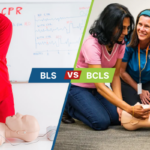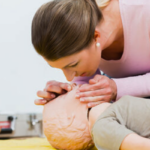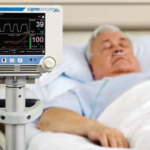
- Last Updated On: July 17, 2024
CPR Certification: How Long does It Last?
Cardiopulmonary resuscitation (CPR) is a life-saving tool when the heart stops beating or beats ineffectively. As a result, it fails to circulate blood to the brain and other vital organs of the body. It keeps the blood flow active and ensures successful resuscitation. Keep reading to explore more about CPR certification, renewal, and how long does CPR certification last.
What is the duration of CPR certification?
Most CPR certifications are valid for two years. You must renew your certification before this tenure ends. Recertification courses are shorter and focus more on updates and reinforcing skills.
What are the factors affecting certification length?
Here are the factors affecting certification length:
- Course type: The complexity of the course influences its duration. If you want to take a basic CPR course, it takes a few hours. On the contrary, if you want more advanced courses, it takes longer.
- Course materials: The distinct CPR courses cover unique course materials. The courses include hands-on practice and a detailed understanding of modules. Hence, these tend to take longer as compared to basic courses that solely focus on CPR techniques.
- Certification requirements: A few certifications have specific requirements. For example, healthcare providers must complete courses that meet certain accreditation standards. Thus, this might have an impact on the course duration.
- Practical training: Courses involving practical training need more time to complete. Practical skills take time to gain proficiency in. Examples of practical training include AED simulations, manikins, etc.
What is the CPR renewal process?
CPR renewal is a crucial part of keeping your skills updated. To stay current, you must renew your certification every two years. You can complete the renewal process online and ensure that your credentials are valid. It also ensures that your skills stay fresh and updated.
Maintaining a current certification is essential during a life-threatening emergency. Here are the steps of the CPR renewal process:
- Identify the expiration date: The first step is knowing the date of expiration. You can get this on your certification card in an email confirmation.
- Choose an online renewal course: Once you have the expiration date, choose a reputable provider offering CPR renewal courses. The online process is convenient and takes less time. Hence, you can easily fit it into your busy schedule instead of spending hours in the classroom.
- Take the course: Register for a course offered by your chosen provider. As they are online courses, you must complete them the same day. These offer flexibility and convenience; they allow you to study at your own pace. This helps you acquire certification at the earliest. The course will cover updated guidelines. CPR techniques and other advancements in the field.
- Pass the test: Make sure you pass the test successfully after completing it. As it is online, the test will evaluate your cognitive understanding and help you perform CPR effectively.
- Maintain your certification: Upon completion, you will receive a certification card. Most providers will mail it to you, and you can download it easily. Maintain a copy of the card and use it wherever needed. Go through The Importance of CPR Recertification.
What are the consequences of expired certification?
Once your certification expires, you will no longer be able to administer CPR interventions. The guidelines and techniques are constantly updated. Having an expired certification means you may not have updated training in the latest CPR techniques. This could result in offering less effective care to the victim. As a result, it might lead to injuries and major accidents.
What are the other relevant health-related certifications?
There are several other health-related certifications, like the following:
- Basic life safety (BLS) certification
- Advanced care life support (ACLS) certification
- Pediatric advanced life support (PALS) certification First-aid certification
- Bloodborne pathogen certification
Renew BLS certification and other courses timely to continue offering life saving support.
What are the benefits of maintaining certification?
A CPR course undergoes several advancements and updates each year. It is crucial to renew your certifications to ensure the following:
- Lifesaving Skills: It teaches you the techniques of lifesaving cardiopulmonary resuscitation (CPR). It also equips you to help out when lives are at stake in emergencies.
- Confidence: Certification instills confidence and convinces anyone that you can manage emergencies. It enables you to act quickly and resolutely when needed.
- Professional Requirements: A lot of hospital and safety jobs in the public sector need CPR certification as part of their job requirements. This guarantees that the industry norms are followed.
- Employment Opportunities: Getting an up-to-date CPR certification helps to strengthen candidates’ resumes. It can also increase job opportunities in different fields.
Conclusion
CPR certification is not just a paper, but it has the ability to save lives and make a difference. Now that you know how long CPR certification lasts, make sure you renew within two years. Maintain your CPR training to keep making positive impacts on individuals. Renew the course online to enjoy flexibility, convenience, and affordability.
Read More: Types Of CPR Certification






